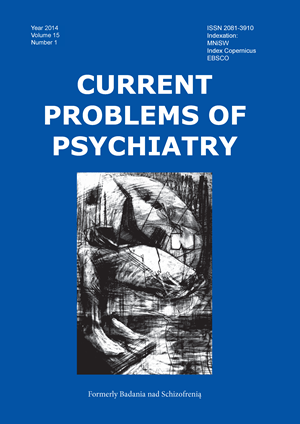The stigma on people with mental illness
Keywords:
stigma, schizophrenia, stereotypingAbstract
Stigma otherwise stigmatizing or labeling applies to people suffering from mental illness, in particular psychotic disorders (including schizophrenia ), because, as shown in the following article presented data CBOS, schizophrenia condemns more than depression, and it raises more pejorative associations than the latter. The consequence of stigma are: treating these patients as inferior people and significant impairment in their functioning in society. There are many theories to explain the existence of stigma in society, recently there have been a lot of trials to define the concept of stigma, to specify the dimensions, functions and mechanisms that make up the process.
Stigma causes the hiding of the disease by the affected people, who are aware of the prevalence of stigma. ( Negative presenting with mental illness on television, in the press, to the excitation of sensation ). This stigma affects people suffering mental illness today or in the past, as well as those who had contact with a psychiatrist. That label is difficult to change, even after the patient's return to the so-called " Normality ".
It is worth to highlighting the role of the individual approach to the patient and the need to educate the public on mental illness. The process consists of stigma - labeling, stereotyping, separating " us" from "them", the loss of social status and discrimination - as described in the article. Social stigma is an issue extremely important, because it makes disorders very chronic, worsening the prognosis by enhancing stress in patients and often inhibit it by making them step towards treatment for fear of social exclusion.
References
1. Jarema M. Leksykon schizofrenii. Poznań; Termedia Wydawnictwa Medyczne: 2010.
2. Grzywa A. Piętno choroby psychicznej. Psychiatria w Praktyce Ogólnolekarskiej. Via Medica: 2004; (4): 149-153.
3. Grzywa A. Magiczna wizja świata. Warszawa; ENETEIA: 2010.
4. Jarema M., Rabe-Jabłońska J. Psychiatria. Podręcznik dla studentów medycyny. Warszawa; PZWL: 2011.
5. Świtaj P. Doświadczanie piętna społecznego i dyskryminacji u pacjentów z rozpoznaniem schizofrenii. Warszawa; Instytut Psychiatrii i Neurologii: 2008.
6. Stephan W.G., Stephan C.W. Wywieranie wpływu przez grupy. Psychologia relacji. Gdańsk; GWP: 2007.
7. Jackowska E. Stygmatyzacja i wykluczenie społeczne osób chorujących na schizofrenię – przegląd badań i mechanizmy psychologiczne. Psychiatria Polska. XLIII (6): 655-670.
8. Zimbardo P. Psychologia i życie. Warszawa; PWN: 2009, s. 606-607.
9. Grzywa A. Pogranicza psychiatrii. Drogi i bezdroża umysłu. Lublin; CZELEJ: 2009.
10. CBOS. Polacy wobec chorób psychicznych i osób chorych psychicznie. Komunikat z badań. Warszawa; 2005.
11. Kępiński A. Schizofrenia. Warszawa; PZWL: 1981.


